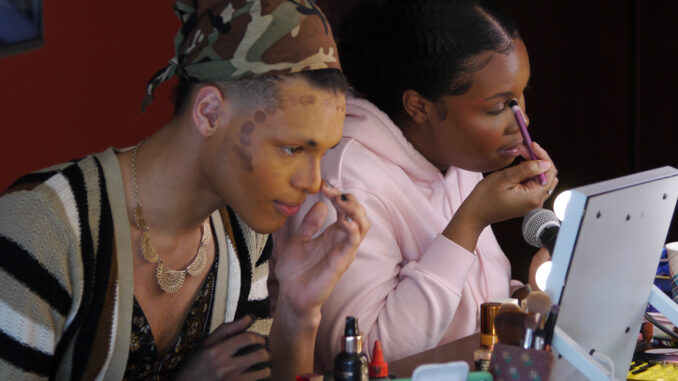
By Giovanni Ravalli and Kate Dempsey
In honor of Black History Month, the LGBTQ+ Resource Center held its second annual Gender-Affirming Makeup Workshop on Tuesday, Feb. 27, in collaboration with LaGuardia Community College and the New York City Council LGBT Caucus.
The event included makeup kits at every table, and those who participated could take photos and selfies of their makeovers in a photo booth. To some attendees, putting on makeup has been a large part of expressing their identities since they were young. “Paint my face,” a colloquial term that translates to transformation, is an outlet for gender expression.
Documentaries such as “Paris is Burning” were some of the earliest exposures to the world of drag and makeup as a form of expression. It documented Ball Culture, an early form of drag shows. Participants named Octavia St. Laurent as an inspiration for their own self-discovery.
“Octavia St. Laurent, it was seeing how little makeup she wore and even when she wore a lot of makeup, she’s iconic, Brooklyn-raised, trans woman in the documentary ‘Paris is Burning,’” Iggy Strickland, a staffer at the Resource Center and a sophomore at BC, told The Vanguard. “To be a brave enough trans woman to be able to walk outside every single day and then not just walk outside but walk outside boldly and like you can take up space. I think that for me was really inspirational and the point where it really resonated deep within me. My drag is a love letter to Black women.”
Attendees expressed that gender-affirming makeup is an intersectional issue, both with race and gender identity; those in the community may face both racism, and gender discrimination. The discrimination can come from within the beauty community itself.
“I think in the beauty space especially we are often times isolated and pushed to the side, especially Black women of a darker complexion and I think oftentimes even non-trans and non-binary black women just generally get comparisons to men a lot and experience some level of transphobia,” Starr Oakley, a sophomore at BC majoring in business management, said. “‘Your nose is too big to be a woman,’ or one of my friends even heard ‘you’re too dark to be a woman’ which, what does that mean?”
The workshop provided tips and tricks for applying makeup, including eyeshadow to accentuate the eyes, or finding the correct foundation shade. To the leaders of the Center, Ball Culture is at the center for more understanding of the power of gender-affirmation as attacks against the Queer community continue.
“The Black History Gender Affirming Makeup Workshop is a wonderful opportunity to showcase student talent and create a space for anyone to explore the world of gender expression through makeup. The legacy of the Ballroom scene and house culture is honored at this event too, as we recognize the Black and Latinx contributions to exploring gender expression through makeup, vogue, and artifice,” Kelly Spivey, Director of the Center, told The Vanguard. “Ball Culture has a long, largely underground history until much of the scene became co-opted, and fairly conventional since the late 1990s. However, as the attacks on LGBTQIA+ rights grow in this country, it’s even more important to remember the legacy of Ballroom.”
To attendees, the Center provides a space for them to openly express who they are. “It’s great to have a safe space for Black and Queer individuals to express themselves authentically,” Andre Rickman, a journalism major and senior at BC, told The Vanguard.
Hosting the gender affirming makeup workshop during Black History Month also stood as a means to express their pride in Black beauty and inclusiveness.
“Black History Month is just an encapsulation of one month and it’s a beautiful month, but it’s almost like Black expression is an everyday thing and that’s something that we think about every day because we walk with it every day. Having something like makeup, which is intentional, it’s a beautiful intersection that makes people think,” said Strickland.
To the leaders of the Center, the workshop is part of their continued efforts to make sure LGBTQ+ students at BC feel heard and supported. The Center emphasizes that transgender people especially need support at a time when many of their rights are not secured.
“[It] is a space where all students are welcome and LGBTQ+ students build community, receive resources, attend events, and become aware of the issues our community faces. The hard-won rights for LGBTQIA+ are celebrated and protected, and students can learn about their rights at the center,” Spivey said, “Trans students especially need our support, as their lives are more visible; they are automatically outed if they live true to themselves, and this is often rife with possible negative consequences. As the director of the Center, one of my biggest aims is to ensure all LGBTQIA+ students, staff, and faculty experience and prioritize queer joy.”
The workshop hopes to be part of a larger movement to ensure Black and Queer representation is protected, highlighting that beauty is more than the makeup put on.
“We’re coming to this turn in society where maybe representation isn’t at its peak, but people are still able to easily see people that look like them and they’re able to have a bit of a more understanding of the things that make people of color beautiful,” Strickland said. “Oftentimes they’re told to paint lesser and to not be as big and bold, and it’s important during Black History Month because I think it’s a time where people feel like they can shine a little bit brighter.”
Students interested in learning more about the LGBTQ+ Resource Center can visit https://www.brooklyn.edu/lgbtq-center/ or visit their office in 219-221 Student Center.
